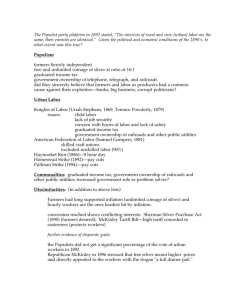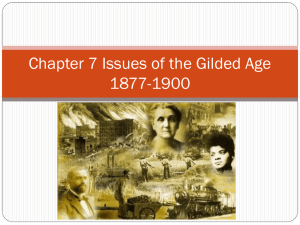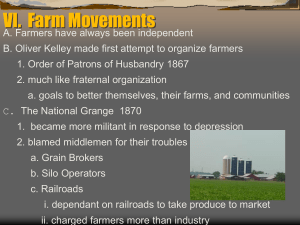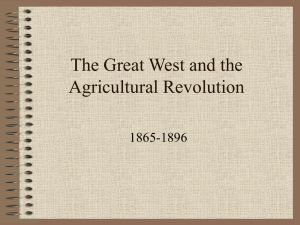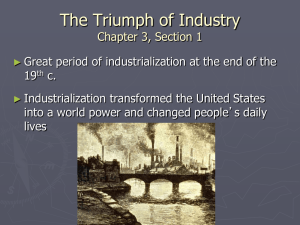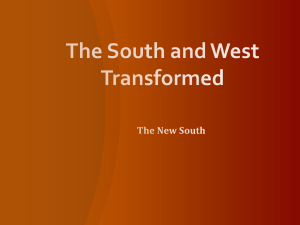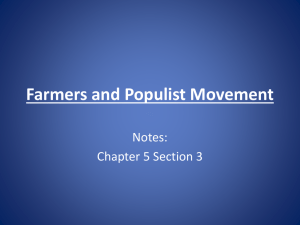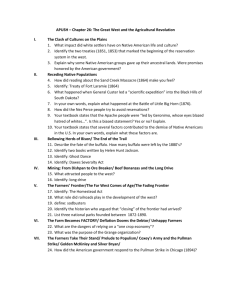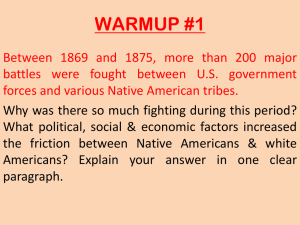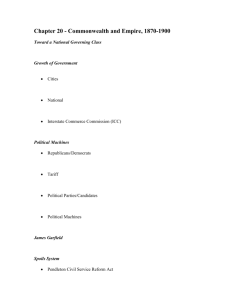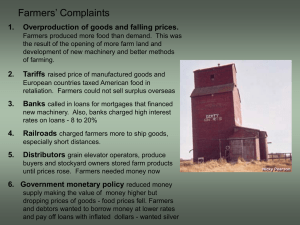not the only - AP United States History
advertisement
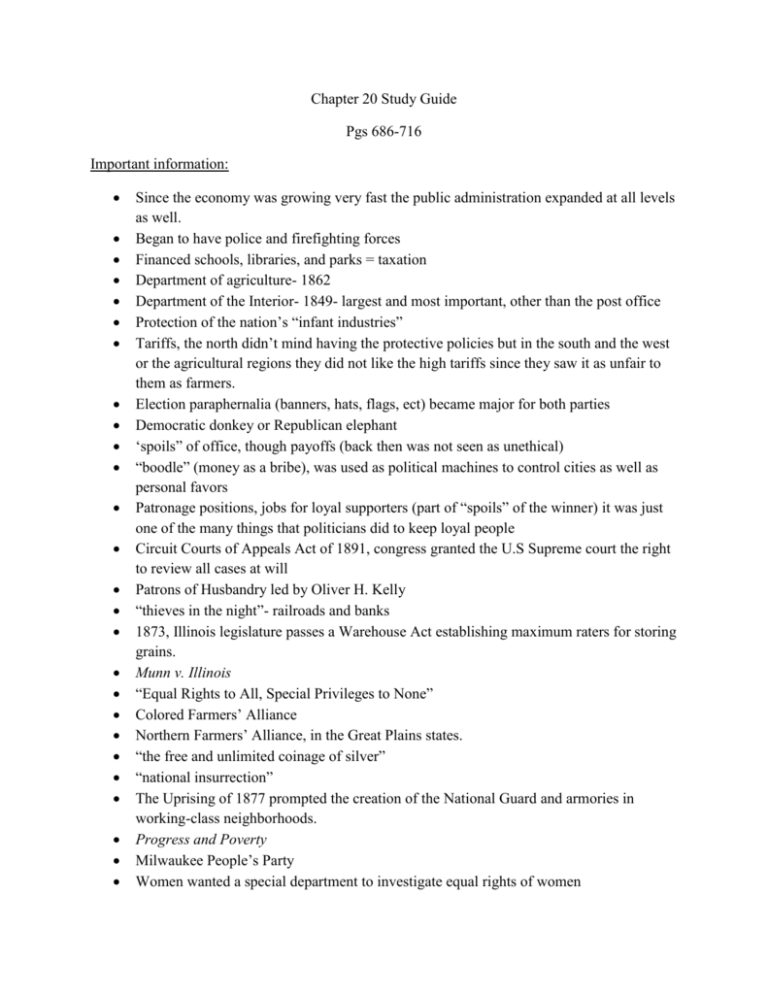
Chapter 20 Study Guide Pgs 686-716 Important information: Since the economy was growing very fast the public administration expanded at all levels as well. Began to have police and firefighting forces Financed schools, libraries, and parks = taxation Department of agriculture- 1862 Department of the Interior- 1849- largest and most important, other than the post office Protection of the nation’s “infant industries” Tariffs, the north didn’t mind having the protective policies but in the south and the west or the agricultural regions they did not like the high tariffs since they saw it as unfair to them as farmers. Election paraphernalia (banners, hats, flags, ect) became major for both parties Democratic donkey or Republican elephant ‘spoils” of office, though payoffs (back then was not seen as unethical) “boodle” (money as a bribe), was used as political machines to control cities as well as personal favors Patronage positions, jobs for loyal supporters (part of “spoils” of the winner) it was just one of the many things that politicians did to keep loyal people Circuit Courts of Appeals Act of 1891, congress granted the U.S Supreme court the right to review all cases at will Patrons of Husbandry led by Oliver H. Kelly “thieves in the night”- railroads and banks 1873, Illinois legislature passes a Warehouse Act establishing maximum raters for storing grains. Munn v. Illinois “Equal Rights to All, Special Privileges to None” Colored Farmers’ Alliance Northern Farmers’ Alliance, in the Great Plains states. “the free and unlimited coinage of silver” “national insurrection” The Uprising of 1877 prompted the creation of the National Guard and armories in working-class neighborhoods. Progress and Poverty Milwaukee People’s Party Women wanted a special department to investigate equal rights of women Edward Bellamy consider the development of a national party (formed by the farmers’ Alliance at a meeting in Ocala, Florida) “the largest opportunity yet presented” “subtreasuries” – local warehouses for farmers “pepper and salt”- black and white candidates on the same slate. Railroads helped usher the depression of 1893 around the country (most went bankrupt) The depression caused many families to “ride the rails” or go “on the tramp” Vagrancy laws caused many people to go to prison since they were sleeping in parks at night. In 1892, there was a wage cut though the Coeur d’Alene district When miners rejected the wage cut and went on strike, the owners brought in strikebreakers to work. But then the strikers blew up a railcar and scared them away “Aristocrats of labor” The Pullman palace Car company Applied Christianity (1886) Young Women’s Christian Association (WYCA) o The “Y’ sponsored services for Christians The Girls’ Friendly Societies Phyllis Wheatley Home “Silver Democrats” o “battle of standards” Erdman Act Gold Standard Act “nadir” and era of widespread repression and violence Chinese Exclusion Act of 1882 The name “Jim Crow” was used to characterize all African Americans o Also used to refer to segregation o Separate but equal Cumming v. Richmond County board of Education Wilmington massacre National Association of Colored women The Columbian Exposition o “timekeepers of progress” Chicago World’s Fair “White Man’s Burden” Women’s Union Missionary Society of Americans for Heathen Lands Students on college campuses started to going missionaries, Student volunteers for foreign Missions Josiah Strong said “Commerce follows the missionary” The U.S started to view the Caribbean as an “American lake” James G. Blaine, secretary of state under presidents Garfield and Harrison, wanted to work out a Good Neighbor policy The Great White Fleet, 90 small ships for America The American China Development Company was created in 1896 to accelerate railroad investment. A secret society known as the Harmonious righteous Fists (or “Boxers”) was against foreign plans Southerners and American still wanted Cuba and since they were not going to be able to buy it, there was much conflict with Spain Cuba Libre Anti-Imperialist Leagues Important people: Democrat, William Marcy Tweed of New York Tammany Hall Michael “Hinky Dink” Kenna of Chicago Thomas A. Jenckes of Rhode island George H Pendleton (sponsor of reform legislation) Henry George(economist and land reformer) Elizabeth Cady Stanton Leonora M. Barry (women general investigator) Mary E. Lease Frances E. Willard (most famous woman) – “make the whole world homelike” Samuel Gompers, head of the American Federation of Labor (AFL) Jacob Sechler Coxey, Populist – “petition in boots” U.S Attorney General Richard C. Olney, former lawyer for the railroads wanted to stop Coxey Carnegie and his chairman Henry C. Frink George M. Pullman – “sleeping cars” Eugene V. Debs, American Railway Union (ARU) James Whitcomb Riley, poet Washington Gladden, Congregationalist minister Methodist minister Charles M. Sheldon of Topeka, wrote In his Steps (1896) Fannie Barrier Williams William Jennings Bryan, Democratic candidate Georgian Tom Watson, vice presidential candidate William McKinley, Republican campaign “a full dinner pail” Ida B. Wells, antilynching, A Red Record Thomas E. Watson Frederick Ward Putman William Henry Seward, Secretary of State Battles: A “Splendid Little War” in Cuba American was against Spain American, under president McKinley, acted towards Spain’s colonies in the Philippines Elections/ Presidents: Hayes Cleveland Theodore Roosevelt Election of 1896 Inventions/Ideas: World’s Fair Ocean liner by International Navigation Company Terms: Interstate Commerce Commission (ICC) – 1887, law that expanded federal power over business by prohibiting pooling and discriminatory rates by railroads and establishing the first federal regulatory agency. (5 members appointed by president) Pendleton Civil Service Reform Act- a law of 1883 that reformed the spoils system by prohibiting government workers from making political contributions and creating the Civil Service commission to oversee their appointment on the basis of merit rather than politics. Populist movement- A major third party of the 1890s formed on the basis of the southern Farmers’ Alliance and other reform organizations Grange- the National Grange of the Patrons of Husbandry, a national organization of farm owners formed after the Civil War. Granger laws- State laws enacted in the Midwest in the 1870s that regulated rates charged by railroads, grain elevator operators, and other middlemen. Farmers’ Alliance- Abroad mass movement in the rural south and West during the later nineteenth century, encompassing several organizations and demanding economic and political reforms. Southern Farmers’ Alliance- The largest of several organizations that formed in the postReconstruction south to advance the interests of beleaguered small farmers. Great Uprising- Unsuccessful railroads strike of 1877 to protest wage cuts and the use of federal troops against strikers; the first nationwide work stoppage in American history. Woman’s Christian Temperance Union (WCTU) - Women’s organization whose members visited schools to educate children about the evils of alcohol, addressed prisoners, and blanketed men’s meeting with literature. National American Woman Suffrage Association (NAWSA) - the organization formed in 1890 that coordinated the ultimately successful campaign to achieve women’s right to vote. Coxey’s Army- A protest march of unemployed workers, led by Populist businessman Jacob Coxey, Demanding inflation and a public works program during the depression of the 1890s Protective association- organizations formed by mine owners in response to the formation of labor unions. Sherman Silver Purchase Act- 1890 act which directed the Treasury to increase the amount of currency coined form silver mined in the West and also permitted the U.S government to print paper currency backed by the silver. Free silver- Philosophy that the government should expand the money supply by purchasing and coining all the silver offered to it. Dingley Tariff of 1897- act which raised import duties to an all-time high Nativism- Favoring the interest and culture of native-born inhabitants over those of immigrants. Jim Crow laws- Segregation laws that became widespread in the South during the 1890s Segregation- A system of racial control that separated the races, initially by custom but increasingly by law during and after Reconstruction. Plessy v. Ferguson- Supreme Court decision holding that Louisiana’s railroad segregation law did not violate the Constitution as long as the railroads or the state provided equal accommodations. Grandfather clauses- Rules that required potential voters to demonstrate that their grandfathers had been eligible to vote; used in some southern states after 1890 to limit the black electorate. Poll taxes- Taxes imposed on voters as a requirement for voting. Time Line: 1867- the Grange was founded 1874- the Granger laws started to regulate the rates that railroads were charging for shipping 1877- election of Hayes and the great uprising of 1877 1879- Progress and Property by Henry George was published 1881- assassination of James A. Garfield, election of Arthur 1882- Chinese Exclusion Act 1883- Pendleton Act was passed 1884- election of Cleveland 1888- Colored Farmer’s Alliance began and election of Harrison 1889- National Farmers Alliance 1890- Sherman Silver Purchase Act and NWSA 1891-People’s party 1892- Homestead strike, lynching 1893- World’s Columbian Exhibition opens in Chicago 1894- “Coxey’s Army” 1896 Plessy v. Ferguson, election of McKinley 1897- Dingley tariff 1898- Hawai’i is annexed, Spanish-American war 1899- Open door policy 1900- Gold Standard Act Summary: Industry continued to take off but ended up putting the country in depression. The hard times of the depression caused many changes and some associations to form. The depression was not the only cause of this but women were starting to speak up for their rights and made organizations to stand together. Court cases sprang up that showed the courts real opinion and that didn’t always make sense with the laws. Money and taxes were a big debate that caused changes in the economy and laws. The change in society was mainly the laws having to do with segregation. Signs were allowed to be put up that separated the people by color, these signs said things like “White people only” or for “Colored” people. Some cases in court helped keep segregation in place. Strikes and lynching’s were major events in the towns. Most lynching’s were not fair to the people it happened to but the strikes happened for fair wages and work conditions.
